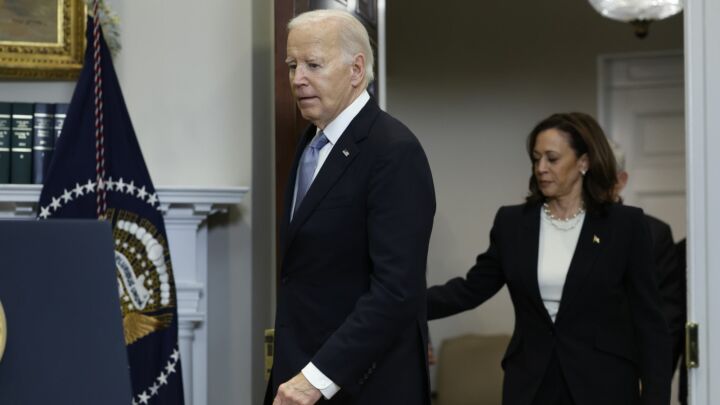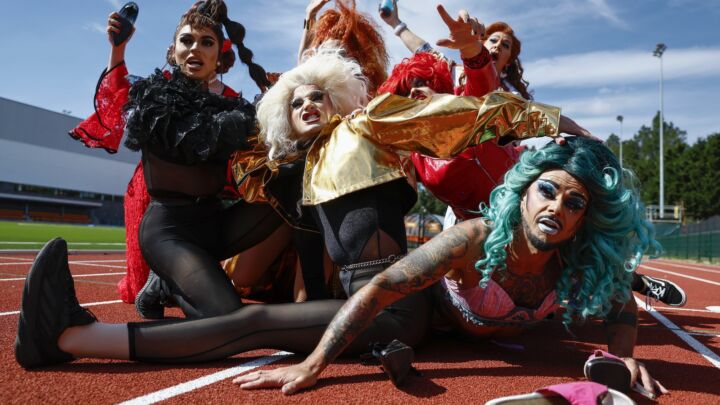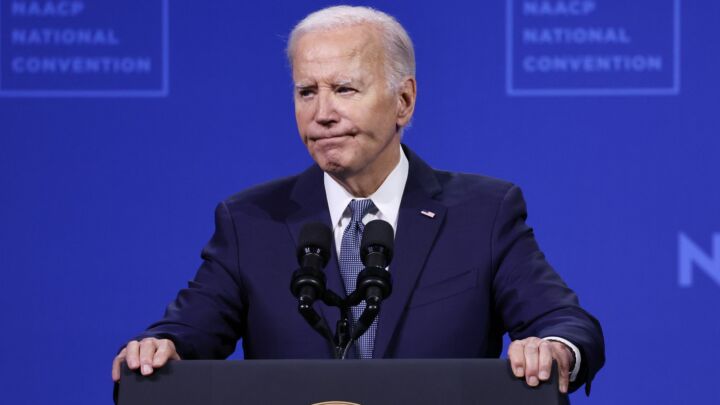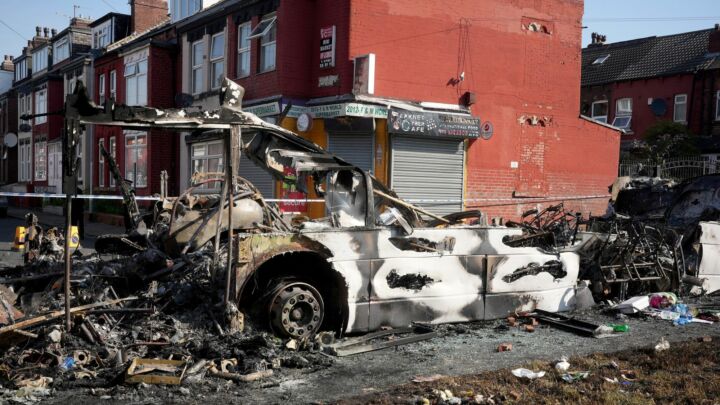The crumbling of the French establishment
The surge in support for National Rally reflects the abject failure of Macron’s technocratic centrism.

Want to read spiked ad-free? Become a spiked supporter.
When Emmanuel Macron first ascended to the French presidency in 2017, he was hailed as the man who could see off the hard right. His re-election in 2022 was taken as further proof that the ‘liberal’ centre could hold – that the ‘leprosy’ of populism, as Macron himself described it, could be contained by his technocratic centrism. Even just three weeks ago, when he dissolved the National Assembly and called snap legislative elections, following the right-wing National Rally (RN)’s thumping victory in the EU elections, Macron and his allies assumed that the populist wave would quickly peter out. Voters would ‘see sense’, they believed, and rally back around the supposedly sensible centre.
How wrong they were. In Sunday’s first round of legislative elections, Marine Le Pen and Jordan Bardella’s RN surged to new heights. With around 33 per cent of the vote, RN has almost doubled its vote share since the last legislative elections in 2022, when it came third. What was once unthinkable is now very much thinkable. RN could yet claim a parliamentary majority in the second round of the elections on Sunday. That means that, by this time next week, France may well have an RN government, with the 28-year-old Bardella as prime minister (he says he will refuse to form a government if he cannot command a majority of seats in the National Assembly).
Meanwhile, Macron’s coalition, Ensemble, was forced into third place by a hastily cobbled together alliance of the left, the New Popular Front. These results are nothing short of a humiliation for Macron and the French establishment.
Far from sending populism packing, Macron has overseen its rapid expansion. In 2017, according to IPSOS polling, the only socioeconomic group to back Le Pen over Macron in the presidential election was blue-collar workers. Today, RN’s support among workers remains strong. It claims its most convincing victories in the former strongholds of the left – in those parts of France where workers have been left behind. But it can also now draw from a considerably broader well of support. Polls suggest that RN is the party whose electorate is most reflective of France as a whole – in age, in sex, in class and in geography.
Voters most loyal to Macron, in contrast, tend to live in the wealthiest business districts and leafiest suburbs of Paris. Yvelines, home to the Palace of Versailles, remains a Macron stronghold, as does Hauts-de-Seine, which holds Paris’s financial district. Macron himself was spotted strolling to the voting booth on Sunday in Le Touquet, a wealthy seaside resort with manicured lawns and fairytale villas, where voters were keen to shake his hand and take selfies.
In the not-too-distant past, the RN could be kept at bay by the establishment’s appeals to a ‘republican front’. Voters from across the political spectrum were prepared to lend Macron their support in order to keep out a party that was widely seen as politically toxic. Indeed, the National Front, as it used to be called, was founded by Marie Le Pen’s father, Jean-Marie Le Pen, a vicious anti-Semite and Holocaust denier. High-ranking early members included a Waffen SS fighter and apologists for the Vichy regime. It is a legacy that Marine Le Pen has gone to great lengths to distance herself from. Her campaign of dédiabolisation (de-demonisation) has clearly succeeded in making the RN more palatable to the average voter. Meanwhile, the establishment’s attempts to demonise the party as fascistic have become increasingly hysterical.
Signs that the republican front was fraying have been visible for a while now. Macron’s vote share declined between 2017 and 2022, and he failed to win a parliamentary majority in 2022. Turnout in the Macron years has tended to be abysmally low. And in the second round of the 2017 presidential election, there was a record three million votes blancs, expressing a preference for neither candidate. Macron managed to ride a wave of apathy to the Élysée, but he has failed to keep a lid on simmering public anger. The high turnout in Sunday’s election was an early indicator that he was in trouble.
Macron’s early success was also largely parasitic off of the crumbling of the old order. The established parties of left and right, which had dominated French politics for most of the Fifth Republic, were reduced to husks in 2017. The centre-right, Les Républicains (LR), are now tearing themselves apart over whether to team up with Le Pen and Bardella or to remain politically independent. That the party of Charles de Gaulle would even consider working with RN would have been unimaginable just a few years ago. It is a sign of a once formidable party desperate not to be an impotent onlooker.
Similarly, the centre-left Socialist Party (PS) went from winning the presidency in 2012 to managing just six per cent of the vote in 2017. François Hollande, the last PS president, is attempting a comeback in the current legislative elections, but even if he is elected to the National Assembly, as part of the New Popular Front, his party is now subordinate to the hard-left La France Insoumise.
Arguably, the left has the most to answer for when it comes to the rise of RN. Once, it would have been the left who aspired to represent the French working class. But today, as Christophe Guilluy argues, the left speaks mostly for a metropolitan elite and views its former working-class base as racist, backward ‘deplorables’. Polls show that the New Popular Front’s voters are mostly young, well-educated and urban. Tellingly, it was also the most popular bloc among those who are ‘privileged’ or ‘wealthy’. The working classes can see that it does not speak for them.
Ultimately, French voters are flocking to RN not because they have suddenly become racist, or fascist or suspicious of liberal democracy, as the establishment likes to claim. They are just desperate for an alternative, and for their concerns about migration, extremism and the state of French society to be taken seriously. They have been abandoned by mainstream parties that no longer even pretend to care about any of this.
All across Europe, populist parties are on the rise because – whatever their respective flaws or baggage – they are willing to challenge an elite consensus that has so manifestly failed. As Macron is now learning to his cost, the populist revolt is just getting started.
Fraser Myers is deputy editor at spiked and host of the spiked podcast. Follow him on X: @FraserMyers.
Picture by: Getty.
To enquire about republishing spiked’s content, a right to reply or to request a correction, please contact the managing editor, Viv Regan.









Comments
Want to join the conversation?
Only spiked supporters and patrons, who donate regularly to us, can comment on our articles.